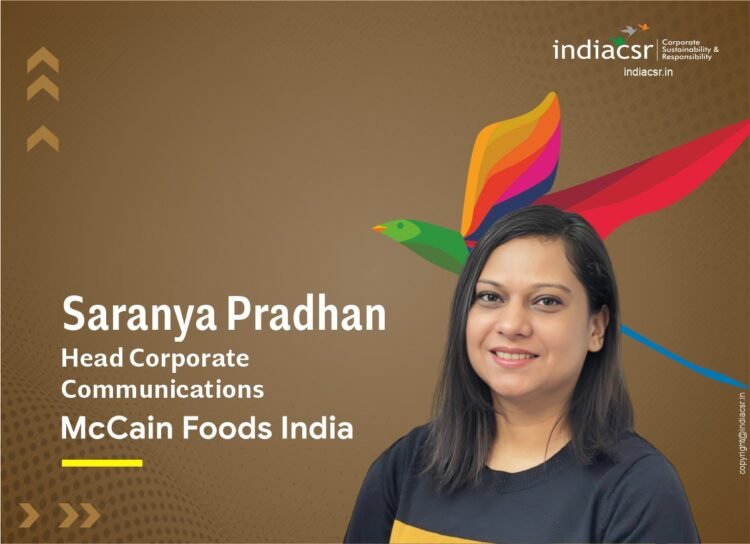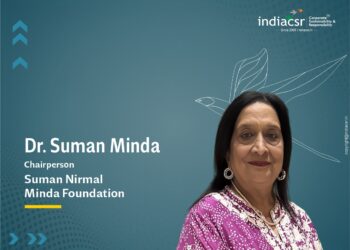
Words Rusen Kumar
In an exclusive email interaction, Saranya Pradhan, Head of Sustainability and Corporate Communications at McCain Foods India, shares valuable insights into the company’s comprehensive sustainability strategy. Exploring the innovative approaches underpinning their commitment to environmental stewardship and community support, Saranya outlines the initiatives that are propelling McCain towards a greener and more sustainable future.
1. Can you outline the four pillars of McCain Foods India’s sustainability framework and their impact on the company’s overall strategy?
McCain Foods India’s sustainability vision is centered around producing food that is not only delicious but also environmentally responsible and socially beneficial. Our strategy is guided by four pillars: ‘Smart & Sustainable Farming’, ‘Resource-Efficient Operations’, ‘Good Food’, and ‘Thriving Communities’. These pillars represent McCain’s commitment to creating good, enjoyable food for its consumers, while keeping the planet at the heart of its operations.
Each pillar signifies a unique aspect of our commitment. “Smart & Sustainable Farming” represents our dedication to implementing regenerative agriculture practices across all potato acreage by 2030, aiming to protect soil health, biodiversity, and mitigate climate change impacts. “Resource-Efficient Operations” underlines our efforts to reduce CO2 emissions and water usage, contributing to the overall efficiency of our operations. “Good Food” embodies our commitment to using healthy and recognizable ingredients in our products, while “Thriving Communities” symbolizes our resolve to support farmers, families, and communities through various initiatives.
*****
2. What specific initiatives has McCain implemented in the past year to advance its commitment to sustainability, and how do you measure their success?
Over the past year, we have made significant strides in advancing our commitment to sustainability. One of the major agricultural practices in our sustainability framework is ‘Regenerative Agriculture’. McCain defines Regenerative agriculture as an ecosystem-based approach to farming that aims to improve farm resilience, crop yield and quality by improving soil health and water quality, optimizing water use, enhancing biodiversity, and reducing the impact of synthetic inputs. As of 2023, over 18% of our Indian potato acreage is now under regenerative practices, and we’re actively enrolling more farmers.
The success of this initiative is measured through a combination of factors, including improved soil health metrics like organic matter content and water infiltration rates. We are also consciously working towards introducing potato varieties that are water stress tolerant. Today more than 30% of potato varieties grown in India by McCain are water stress tolerant varieties.
Regenerative agriculture not only improves soil health but also helps cut off carbon, leading to a reduced environmental footprint. We measure the success of these practices via regular farmer feedback on yield improvement and profitability to ensure the program’s economic viability. Another measure of success is also the number of farmers we train on regenerative practices, and their adoption of the same across their farms.
Other methods of measuring success against our pillars are through various key performance indicators such as CO2 emissions intensity, water-use efficiency, etc.
*****
3. Could you detail how McCain is reducing its environmental impact through regenerative agriculture and sustainable packaging?
McCain has been actively working on reducing its environmental footprint through various strategies. In addition to regenerative agricultural practices, McCain has been focusing on practices such as crop rotation, cover cropping, and minimal tillage to improve soil health, water retention, and biodiversity while reducing the need for synthetic inputs.
Additionally, McCain has been exploring packaging solutions like compostable materials, recyclable packaging, and reducing overall packaging waste to minimize its environmental impact. One of our goals is to make 100% of the packaging recyclable, reusable or compostable. Currently, we have achieved this for 91.7% of our packaging in India. These are some of the efforts that demonstrate McCain’s commitment to sustainability and reducing its carbon footprint.
*****
4. How is McCain advancing towards its emissions reduction targets, and what measures are in place to achieve these goals?
Our commitment to sustainability in India is reflected in measurable progress. Since 2017, we have achieved a 20% reduction in CO2 emissions intensity in our farming operations, signifying a positive shift towards more efficient production processes.
To further reduce our carbon footprint, we’re actively investing in renewable energy sources and exploring additional operational efficiencies that minimize energy consumption. Currently 20% of total electrical energy consumption for our manufacturing operations come from renewable sources. McCain is actively engaged in measuring and monitoring its emissions, conducting regular audits, and setting transparent reporting mechanisms to track progress towards its reduction targets. The company also collaborates with suppliers, partners, and industry stakeholders to explore innovative solutions and best practices for further emission reductions.
By prioritizing sustainability and taking proactive steps to mitigate its environmental impact, McCain is demonstrating its commitment to combating climate change and fostering a more sustainable future for generations to come.
*****
5. Could you describe McCain’s approach to achieving zero waste to landfill by 2025?
McCain’s approach to waste management is rooted in its commitment to sustainability and environmental stewardship. We can proudly state that we have achieved our goal of achieving zero landfill waste ahead of our set goal for 2025. Presently, any food and non-food waste that is generated in the process of creating McCain products is reused or recycled and none of it goes to landfill.
To achieve this, McCain employs a comprehensive waste management strategy that focuses on three main pillars: reduce, reuse, and recycle. Firstly, McCain minimizes waste generation by optimizing production processes, reducing wastage at the source at the farm itself, redesigning packaging materials, and implementing efficient resource utilization practices. Secondly, the company emphasizes the importance of reusing materials wherever possible, whether through internal processes or by collaborating with suppliers and partners to repurpose materials. Finally, McCain prioritizes recycling as a key component of its waste management strategy, ensuring that materials such as cardboard, plastics, and organic waste are diverted from landfills and recycled into new products or used for energy recovery.
*****
6. How does McCain maintain transparency and accountability in its sustainability efforts, and how are these communicated to stakeholders?
We maintain transparency through our comprehensive Annual Sustainability Report, which details our progress against set goals, including data specific to our Indian and global operations. Furthermore, we actively engage with stakeholders through various platforms to foster open communication and accountability.
*****
7. Could you discuss McCain’s initiatives, like Project Shakti, that support the livelihoods of vulnerable farmers and their families in India?
McCain has several initiatives aimed at improving the livelihoods of vulnerable farmers and families, one of which is ‘Project Shakti’ in India. Project Shakti spotlights on empowering women in rural areas by providing them with training and resources to become entrepreneurs in the agricultural sector. So far, Project Shakti has helped establish more than 100 self-help groups reaching nearly 1500 rural women, providing support on savings and income generation activities.
Driven through partnerships with local NGOs and government agencies, McCain’s Project Shakti helps women access agricultural inputs, technology, and market linkages, thereby increasing their income and livelihood opportunities. Women can contribute more effectively to household income, which in turn improves the well-being of their families and communities. Additionally, Project Shakti fosters a supportive environment for girls, encouraging them to pursue education and break gender stereotypes.
*****
8. How does McCain’s sustainability strategy support the UN’s SDGs, and what initiatives are being implemented to meet these goals?
McCain’s sustainability strategy aligns closely with the United Nations’ Sustainable Development Goals (SDGs), particularly those related to zero hunger (SDG 2), responsible consumption and production (SDG 12), climate action (SDG 13), and partnerships for the goals (SDG 17).
To ensure these goals are met, McCain has applied various initiatives across its operations. For zero hunger, McCain works towards promoting food security and nutrition through initiatives like Project Shakti, empowering farmers, and women, to improve agricultural productivity and livelihoods.
In terms of responsible consumption and production, McCain focuses on reducing food waste, enabling sustainable sourcing practices and investing in energy-efficient manufacturing processes. In the realm of climate action, McCain has pledged to reducing its carbon footprint by employing regenerative agriculture practices, investing in renewable energy, and adopting ecological packaging solutions.
Moreover, McCain actively seeks partnerships with stakeholders, including governments, NGOs, and local communities, to collaborate on sustainable development projects and promote knowledge sharing. By aligning its sustainability efforts with the UN SDGs and implementing initiatives across its value chain, McCain demonstrates its commitment to addressing global challenges and contributing to a more sustainable future.
*****
9. Looking ahead, how does McCain plan to further reduce its carbon footprint and water consumption?
McCain is dedicated to minimizing its environmental impact through advanced strategic measures. Our emphasis is on reducing our carbon footprint and water consumption by leveraging renewable energy sources, investing in energy-efficient technologies, and refining our manufacturing processes for lower emissions. Our goal is to be a 100% renewable energy by 2030, we are signatories to RE100. We are also signatories to the Ellen MacArthur Foundation to accelerate the transition to a circular economy.
For water conservation, we’re improving efficiency across our operations. This includes the adoption of advanced irrigation methods, implementation of water recycling systems, and optimization of water use in our processing facilities. Furthermore, we’re partnering with suppliers and farmers to encourage sustainable water management practices throughout our supply chain.
By prioritizing these initiatives and constantly seeking areas for improvement, McCain aims to significantly reduce its environmental footprint and encourage a more sustainable future.
*****
10. Finally, could you share McCain’s vision for sustainability and the key strategies planned to achieve this vision?
McCain’s purpose is to celebrate real connections, through delicious planet-friendly food. – and every action taken as an organization is guided by this. We plan to achieve this through our commitments outlined in our four pillars of sustainability. By integrating sustainability into every aspect of our business, we aim to raise the bar for sustainable food production and contribute to a healthier planet.

Saranya Pradhan, Head of Sustainability and Corporate Communications at McCain Foods India
Saranya Pradhan is a seasoned professional with over a decade of experience in the manufacturing industrial sector, currently leading the Sustainability and Corporate Communications at McCain Foods India. She is recognized for her visionary leadership in steering the company towards a sustainable future, aligning business practices with environmental stewardship and community support.
At the core of Saranya’s professional philosophy is the belief that businesses can and should operate in a way that benefits the planet and its people, demonstrating that profitability and sustainability can go hand in hand.
(Copyright@IndiaCSR)























